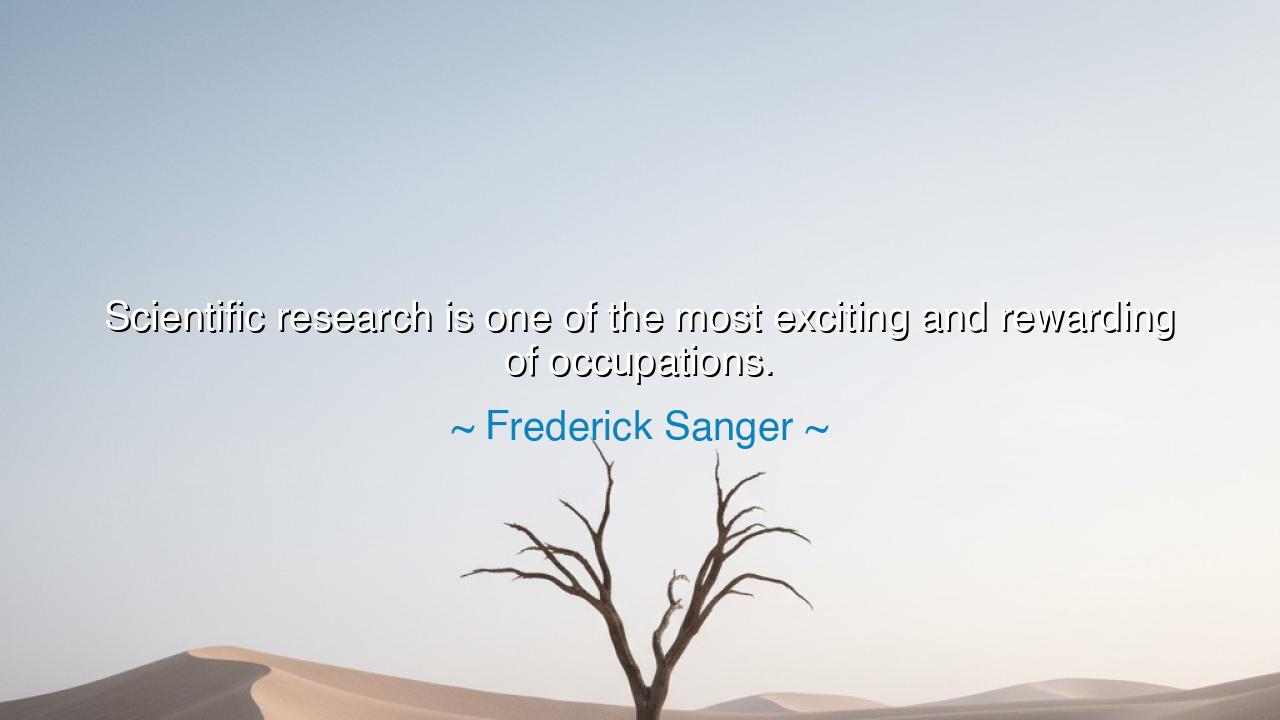
Scientific research is one of the most exciting and rewarding of






"Scientific research is one of the most exciting and rewarding of occupations." These words, spoken by Frederick Sanger, a two-time Nobel laureate, capture the essence of what it means to truly dedicate oneself to the pursuit of knowledge. To Sanger, scientific research was not just a job or a task—it was an adventure, a calling, a lifelong journey of discovery that filled the heart with excitement and purpose. It was a path where every answer brought with it new questions, and each discovery opened the door to a deeper understanding of the world. The pursuit of science, for Sanger, was not just an occupation; it was an invitation to explore the very mysteries of existence and to contribute to the greater good of humanity.
In the ancient world, the pursuit of knowledge was seen as the highest calling, one that transcended mere survival or comfort. The Greeks, especially Plato and Aristotle, revered the pursuit of wisdom as a path that connected the human soul to the eternal truths of the universe. They saw the philosopher and scientist as seeking the divine, uncovering the hidden principles that governed both the natural world and human existence. Socrates, that greatest of thinkers, dedicated his life to asking questions and seeking answers, knowing that the path to knowledge was long, difficult, and often filled with uncertainty. Yet, it was this very journey—filled with challenges—that made the pursuit of knowledge so deeply rewarding. For the ancients, the excitement of discovery was not just about understanding the world but about finding meaning in life itself.
Frederick Sanger’s view of scientific research reflects this ancient reverence for knowledge. He recognized that the act of discovery was not just about solving problems; it was about engaging in a personal journey of exploration, where the challenges of research were matched only by the joy of understanding. Sanger's groundbreaking work in genetic sequencing opened up new worlds of possibility, yet it was not the end of the journey for him. Each scientific breakthrough led to new questions, new mysteries to solve. His approach mirrors the way the ancient philosophers viewed knowledge—not as an end but as an ongoing process of exploration and illumination. In this way, scientific research becomes both a practical task and a spiritual pursuit—a way to connect deeply with the world and to uncover the truths that govern life itself.
The excitement that Sanger speaks of is evident in the story of Marie Curie, whose pioneering research in radioactivity transformed our understanding of physics and chemistry. Curie faced immense challenges—being a woman in a male-dominated field, working in a time when scientific research was often underfunded and undervalued. Yet, she found the excitement of discovery to be her driving force, a reward that far outweighed the hardships. Her relentless pursuit of knowledge, even in the face of danger (as her research exposed her to harmful radiation), exemplifies the passion that comes with being a scientific researcher. Like Sanger, Curie understood that the thrill of discovery—the uncovering of secrets hidden in the world—was worth the sacrifices made along the way. Her story teaches us that scientific research is not just about intellectual achievement; it is a pursuit that demands both courage and conviction.
Sanger’s own work, particularly in sequencing DNA, transformed the landscape of genetics. Before his contributions, the idea of mapping the genetic code was merely a dream, a distant goal. Yet, through years of meticulous, detailed work, Sanger and his colleagues made the dream a reality. But what Sanger knew, and what his words reflect, is that each breakthrough leads to even more opportunities for discovery. The mapping of the genome did not end the quest for understanding; it began a new chapter of questions about genetic diseases, gene therapy, and the very essence of life itself. The reward of scientific research, as Sanger saw it, is not in the final product but in the process—the exploration, the discovery, and the unveiling of the unknown.
There is a deep lesson here for us all: scientific research, like any great pursuit, requires dedication, curiosity, and perseverance. Whether we are studying the mysteries of the universe or trying to solve everyday problems, the excitement of discovery is what makes the journey worth it. Every question we ask opens up new possibilities, and each solution leads to further questions. This is the true reward of research—not the end result, but the journey itself, where we are constantly growing, learning, and changing. To approach life with this mindset, to see every challenge as an opportunity for discovery, is to engage in a life of endless wonder and excitement.
In your own life, embrace the spirit of scientific exploration. Whether you are a scientist in the laboratory or someone simply navigating the challenges of your daily life, recognize that every obstacle is an opportunity to learn, to grow, and to discover something new about the world and yourself. Follow Sanger's wisdom and view your challenges as stepping stones to greater understanding. Approach each new problem not as a burden but as a chance to uncover a hidden truth. And when you discover something new, celebrate not just the outcome, but the journey—the process of exploration, the thrill of learning, and the reward of a life lived in pursuit of knowledge.






AAdministratorAdministrator
Welcome, honored guests. Please leave a comment, we will respond soon